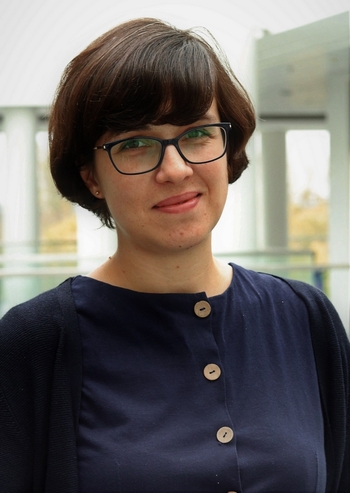Dr Iwona Dembowska-Wosik, Assistant Professor at the Department of Applied and Cultural Linguistics at the Faculty of Philology of the University of Lodz, lecturer and supervisor of Ukrainian students of Studies on Poland with English is the author of the text. The introduction and headings come from the editorial office.
 Dr Iwona Dembowska-Wosik
Dr Iwona Dembowska-Wosik
Studies on Poland with an intensive language course
Since 2022, the Institute of Polish Philology and Logopaedics has been running a new study programme – Studies on Poland with English. Its concept refers to the format of Polish studies at foreign universities – the curriculum consists of intensive learning of Polish as a foreign language and literary, linguistic and cultural studies. Work on opening this "Polish studies for international citizens" began even before the outbreak of the pandemic and at the beginning of 2022 the Faculty of Philology was preparing itself for the recruitment. However, the outbreak of war in Ukraine meant that the Studies on Poland with English were launched in an accelerated mode, starting in May. Twenty nine students were admitted – young Ukrainians, most of whom fled before the war to Poland. In autumn, more people applied and there are currently almost sixty Ukrainian citizens who joined "Studies on Poland with English".
For some of them, these studies are a dream come true. For others, they are a way to survive the time of great uncertainty. Without exception, however, intensive learning of Polish language, Polish culture, literature and history requires a huge amount of work and deep commitment from the students.
The similarity between the languages makes it easier but can also hinder learning
Polish and languages spoken in Ukraine (Ukrainian and Russian) belong to the family of Slavic languages. Taking into consideration the diversity of the world's languages, it can be said that they are very similar to each other. This does not mean, however, that learning Polish is easy for Ukrainian speakers. The close relationship of the native language with the language that is being learnt results in a phenomenon called transfer in glottodidactics. It consists in transferring structures and meanings from one language to another. Sometimes it makes things easier – for example, when the learner understands the text better because they recognise elements that occur in their native language. This is also often the case during the classes conducted as part of the Studies on Poland. Thanks to this, lecturers communicate with students in Polish from the first weeks.
However, the transfer can make language learning more difficult – it can be said that in the case of differences between languages, old habits win and that is why we observe, for example, that Ukrainians say "ja był", "ty widziała" (copying past tense forms from East Slavic languages) or declare that they "lubią" their family (confusing Polish verb ‘lubić’ meaning ‘to like’ with Ukrainian любити, meaning 'to love'). It should also not be forgotten that in Ukraine a different alphabet is used, so moving to Polish means that the students need to efficiently use a new writing system. In this area, the transfer also occurs resulting in confusing similar letters, such as Polish c and Ukrainian c [read as s] or Polish y, in Ukrainian read as [u].
Poland – a country of ground floors, ticket machines and... kind people
These substantive difficulties are just some of the challenges faced by the Ukrainian students. Polish culture – although close from the world diversity perspective – can surprise them. Starting from a complicated neighbourly history, in which the often conflicting interests of Poles and Ukrainians became a source of much suffering and ending with prosaic everyday matters such as public transport or the healthcare system. The students praise the way public transport in Lodz is organised. They have already got used to buying tickets in ticket machines (in Ukraine you pay directly at the driver) and the fact that ticket inspectors are dressed like ordinary passengers.
Initially, misunderstandings were also caused by the numbering of floors in Polish buildings – our ground floor is the Ukrainian first floor. The ban on trading on Sundays and holidays is a nuisance, because in Ukraine shops are open 7 days a week, and some even around the clock. The students were also unpleasantly surprised by how long, compared to what they are used to, we wait for an appointment with a specialist in Poland. On the other hand, they value Polish politeness – in their opinion we are the ones who very often use such words as "please", "thank you" and "sorry". Cultural differences also manifest themselves in the teaching process. In the Ukrainian education system, being correct and accurate is valued more than self-reliance, which is why our insistence that the work should be imperfect, but performed without help, was initially received with disbelief. Every week, however, makes us know and understand each other better.
Studying in times of uncertainty
Entering the university world is difficult for everyone, and how much more difficult it must be when you study outside your home country, in a situation where there is a war at home. Uncertainty, painful memories, longing for loved ones, fear for their safety, ethical dilemmas related to the chosen path – this is also what Ukrainian students of Polish universities constantly face.
As lecturers, we respect their strength and courage, we try to surround them with favour and care, and at the same time we are grateful for their commitment, creativity and numerous talents that we observe during the classes. We really hope they will be able to return home as soon as possible, and at the same time we would like them to stay, because we know that, thanks to them, Polish society is more diverse and culturally richer.
Text: Dr Iwona Dembowska-Wosik, Faculty of Philology, University of Lodz
Edit: Communications and PR Centre, University of Lodz
